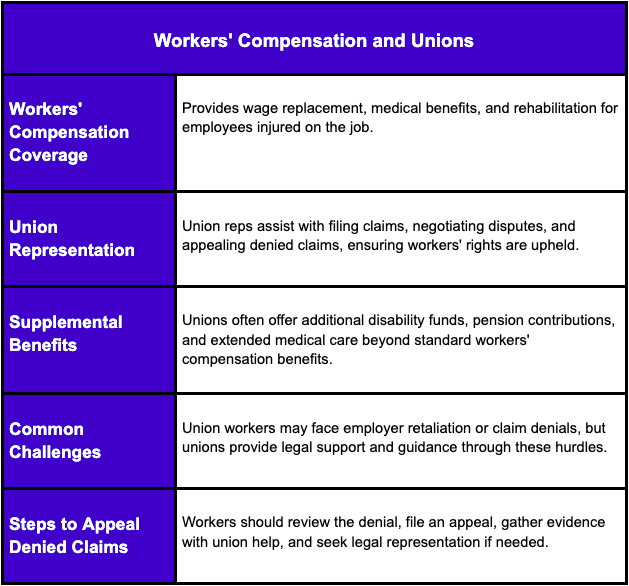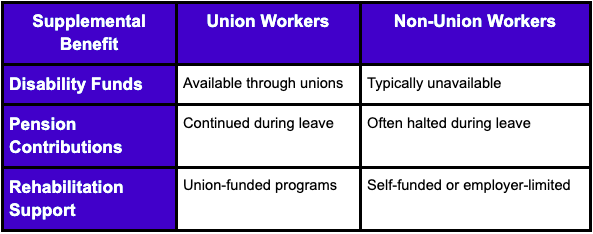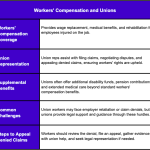Intro: Unions and Workers' Comp
The relationship between Unions and Workers Comp involves member education and advocation - union workers are fully entitled to workers' compensation and may actually have increased benefits.
Unions are designed to benefit employees. They accumulate the collective power of the workforce to protect various industries from mismanagement, unfair pay, labor extortion, and anything else that could degrade workers' situations to increase profits.
Injuries on the job are a serious concern for countless professionals - across all industries - and it is very important to understand what you should expect following an injury.
Top PA workers’ compensation attorneys, RG Injury Law, offer sound legal advice for union workers navigating workers’ compensation in PA. Call today for expert legal guidance!
Key Takeaways
- Workers' compensation covers wage replacement and medical benefits.
- Union contracts can improve compensation benefits.
- Workers' comp claims can be denied; unions provide support during appeals.
- Union representation helps employees navigate their rights.
- State laws vary in how workers' compensation is applied.

What Is Workers' Compensation?
Workers' compensation is a legal system that provides financial and medical benefits to employees injured on the job.
It’s designed to cover medical expenses, lost wages, and rehabilitation costs without needing to file a lawsuit. Each state has specific laws governing workers' compensation, but generally, employers must carry insurance to cover these benefits.
Things to Know about Workers’ Comp:
- Replaces a portion of lost wages.
- Covers medical expenses related to the injury.
- No lawsuit required for compensation.
- Administered through state laws.
- Available to most employees, with a few exceptions.
Workers' Compensation Rights for Union Workers
Union workers have specific rights under workers' compensation laws that often exceed those of non-union employees.
Collective bargaining agreements typically allow union members to have access to better coverage and support when filing claims.
The union acts as an advocate - helping workers understand their rights and ensuring employers follow legal guidelines.
Additionally, unionized workplaces may have additional resources. An additional resource may be designated representatives to handle workers' comp disputes and ensure workers are treated fairly and compensated appropriately.
How Union Contracts Affect Workers' Compensation
Union contracts often include provisions that enhance the standard workers' compensation benefits. These agreements may increase wage replacement rates, extend medical coverage, or provide additional benefits like retraining programs.
Contracts can also enforce quicker response times from employers or insurance companies to prevent delays in receiving benefits.
What to Remember:
- Higher wage replacement rates: Union workers often receive 80-100% of their wages, compared to 60-70% for non-union workers.
- Extended medical coverage: Union members may have access to long-term care and rehabilitation programs that exceed basic coverage.
- Support in filing claims: Union representatives assist with paperwork and negotiations, while non-union workers must manage claims on their own.
- Appeals process assistance: Unions provide legal support and guidance during appeals, unlike non-union employees who handle appeals individually.
The Role of Union Representation in Workers' Compensation Claims
Union representatives help injured workers with their claims. They assist in filing claims or negotiating with employers with experience and confidence.
They help clarify workers' rights and ensure paperwork is submitted correctly and on time. If issues arise, such as disputes over benefit amounts, union reps step in to advocate on behalf of workers, often bridging the gap between employees and employers.
Key Points:
- Assist in filing claims correctly and promptly.
- Advocate during disputes with employers.
- Provide legal support if claims are denied.
- Help secure additional benefits through union agreements.
- Ensure that workers understand their full rights.
Common Challenges Union Workers Face in Workers' Compensation
Union workers face unique challenges in workers' compensation cases. One of the most common issues is employer retaliation.
Even though it’s illegal, some workers may feel pressured after filing a claim.
Additionally, benefit denials can leave employees struggling to get the compensation they deserve.
Legal representation is essential here, as unions often step in to push back on employers and insurance companies that try to minimize benefits or deny claims outright.
Supplemental Benefits Offered by Unions
Unions often provide supplemental benefits that go beyond standard workers' compensation.
These can include additional disability funds, pension benefits, and even access to rehabilitation programs.
Many unions negotiate for extended medical coverage and higher wage replacement rates to provide more security to injured workers.
Supplemental Benefits Comparison:

Steps to Take If Your Workers' Compensation Claim Is Denied
When a workers' compensation claim is denied - act fast.
The first step is to review the denial notice carefully. Understand the reasons provided. From there, union members can turn to their union for support.
Filing an appeal is often the best course of action. A union can provide legal assistance throughout this process. Unions often have resources like legal teams and advisors to help injured workers gather evidence and build a strong appeal case.
In addition to filing an appeal, it’s important to maintain consistent communication with your union representative. They can help ensure that deadlines are met and that all necessary documents are submitted.
Being proactive and having union support can significantly improve your chances of a successful appeal.
How Unions Help in Filing Workers' Compensation Appeals
Gathering Evidence
Unions assist workers in gathering necessary evidence to support their claims. This can include medical records, witness statements, and any relevant work documentation.
Legal Representation
Union legal teams provide representation throughout the appeals process, offering a critical advantage in hearings and negotiations.
Enforcing Contracts
Union contracts often contain provisions that protect workers’ rights to compensation. Unions help enforce these agreements during appeals and ensure employers follow the negotiated terms.
Conclusion: Protecting Your Workers' Compensation Rights in Unionized Workplaces
Unions almost always bolster their member's Workers’ Comp benefits. Perks like expert representatives, collective bargaining, and filing assistance is invaluable for workers everywhere. Unexpected injuries happen all the time - fighting your boss for just compensation is the last thing that will help recovery.
RG Injury Law is a dedicated resource for anyone in Pennsylvania facing a workers’ comp or personal injury case. Union or not, you deserve the compensation you are entitled to and we will fight until you receive it. With our long track record of success in PA Workers’ Comp cases - you can rest assured the best is on the case.




